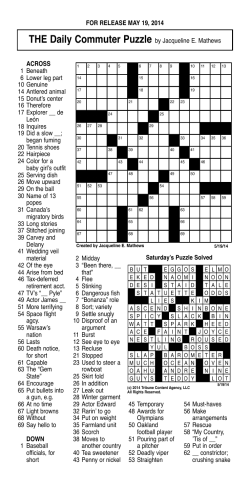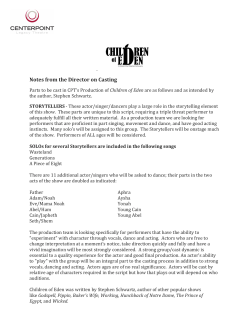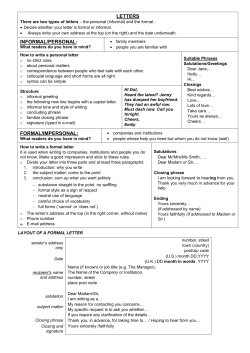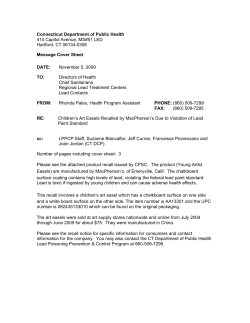
MEMORIZATION & PRACTICE Y O R
Y O R K U N I V E R S I T Y De par t me n t of The at re MEMORIZATION & PRACTICE THEA 2010 VOICE I Eric Armstrong [email protected] C F T 3 0 6 , 4 7 0 0 K e e l e S t . To r o n t o O N M 3 J 1 P 3 • t e l e p h o n e : 4 1 6 . 7 3 6 - 2 1 0 0 x 7 7 3 5 3 • h t t p : / / w w w. y o r k u . c a / e a r m s t r o Memorization What is Memorization? Committing something to memory is a process that all actors working outside of Improvisation need. Memory is a complicated process whereby images, sounds, ideas, words, phrases, and even times and places are encoded, so we can recall them later. To effectively learn “lines,” one may use several different kinds of memory at different times in the process of encoding, storing and recalling the text at hand. The basic learning of a single line begins with you using your working memory to get the line off the page and into your head. At this stage of the process, you can repeat the line while looking at an acting partner, or moving around the space, but it won’t last more than a few seconds. The next phase is when the text gets encoded into the short-term memory. These kinds of memories will stay in your mind for a few minutes at most. For your memory work to be useful, the language of the play must be transferred into your long-term memory. There is some speculation that material that enters the long-term memory is, in fact, always stored in the brain. What becomes lost is the means to retrieve the “data.” Generally, the actor’s memorization process is semantic in nature, a memory of knowledge, meanings and understandings. However, it may also be episodic in nature, particularly if it is memorized in a manner that involves spatial relationships (such as blocking, e.g. what you do when you say line x). In some cases, memory may involve visual or spatial memory, particularly if you’re the type of memorizer with a “photographic memory,” seeing the text on the page as you read it back in your mind’s eye. The short-term memory can only hold so much at one time. Generally, people can hold between 5 and 9 things in their minds at once time, with 7 being the average. Note that phone numbers are 7 digits long. These items are more readily memorized when they are clustered into chunks, so 767-6093, with two chunks, is more memorable than 7 6 7 6 0 9 3. This process of chunking is an important tool for the actor. It’s a means of organizing the information that you’re learning. Often the writer of the text will have clustered many points of an argument, steps in a story or images together, making the piece effective. Identifying this structure will make it more memorable, and help you to find the chunks of thought within it. There are six principal reasons why things stick in your short term memory. First things first, it is easy to remember the first part of something you are learning, partly because it was new and unique and our attention is still well focused, but also first things tend to get rehearsed more; this is called primacy. Similarly, the last thing you learn is likely to be memorable because it’s been in your memory the shortest time, and it’s memory hasn’t had time to degrade; we call this recency. Distinctiveness describes when something unusual, like an unusual image or word, stands out, making it more memorable. Apparently sensual things (like bawdy humor) are particularly good at standing out, so making those kinds of connections to your text is actually a good thing. It’s pretty obvious that the frequency effect, which occurs when you repeat something over and over, is an important part of any memorization process. Associations are very important - the more links that you can make to ideas behind the text, to images within the text and to other words and phrase of the text, the easier it will be to recall. This can be elaborations, associating the text with other information, and personalizations, associating the text with ideas and images from your own experience. Finally, we often fill in the blanks in our memories, a process called reconstruction, T H E A 2 0 1 0 : Vo i c e I Memorization & Practice 1 when we make an educated guess as to which word belongs in the gap in our memory. These concepts can help you to tailor an effective memorization technique that is suited to your needs. Once you’ve learned your lines, you must be able to recall what you’ve learned. Cues, like the line that comes before your line, serve to spark our recall. Each cue must serve as the spark that ignites the fire of your memory. Making a clear visual image of the connection of the ideas and/or images in the cue and your text can be very effective. But cues can be far more than just a line of text. In a monologue, you can build your own ‘cues’ into the text, reminding you of what comes next. Each image, thought, operative word can be imagined as craving the next word, image, or thought. Find or make linkages between them, so they are easier to recall. What causes us to forget? As actors are typically juggling many thoughts at once, the most likely cause of drying on a line is a distraction. Frequently, our fear of forgetting our lines is enough to distract us from the associations that would bring the lines back. This in turn can cause you to stop breathing, to focus on what you’ve said last, and to try to visualize something that may have not been learned visually in the first place. It has been shown that there is a mood component to memory, and that people remember things that they associate with the mood that they are currently in. People struggling with memory issues are likely to be in a highly alert state, perhaps feeling anxiety, fear, frustration. However, when they learned their lines they are feeling none of these things – frequently people learn lines free of emotional affect, in what some people call a flat read. Finding a way to rehearse in the appropriate state of being for the character may be more effective, so that when one is trying to recall the lines the mood matches the state in which the lines were encoded. Also, an effective warm-up that centers the actor may help to reduce anxiety around preparation, so that negative feelings are less likely to distract from the focus on the performance. Frequently people forget what they thought they knew the night before. This may be a case of pseudoforgetting, where inattention in the memorization process keeps the text from being effectively encoded. Typically, actors have learned their lines statically, with no distractions, and when they begin to test their memory while moving, acting or engaging with another actor or an audience, they become distracted. In the process of testing your memory, it is important to advance to the stage of multi-tasking, doing the text while doing something else, to see whether you truly know it. What matters most is that you use the techniques that work best for you and that you try to find ways to learn lines using as many different memorization modes as possible, creating a web of links between words, ideas, thoughts, images, impulses, actor choices such as intentions, sounds and actions, so that your text is readily available. Over time you will begin to forget what you know. This kind of forgetting is primarily a loss of how to retrieve the stored information. It’s as if you’ve lost the map of how to get back to those memories. It has been shown that things once learned and then forgotten are much more easily remembered than things that have never been learned at all. So if your goal is to learn a repertoire of audition pieces, a strategy for reviewing those pieces should be part of your practice. Why study memorization technique? - memory is a skill, and it can be trained - quick studies are more employable - skilled memorizers are more confident, and have less anxiety about preparation & performance - quick memorization leaves more time for effective, meaningful preparation & rehearsal - those confident with their texts are more capable of being present with their acting partner, of listening effectively, finding emotional states, taking risks T H E A 2 0 1 0 : Vo i c e I Memorization & Practice 2 - in the business, scripts/sides are often faxed/emailed to actors with less than 24 hrs to prepare What does it take to be an effective memorizer? Note that few people have an innate gift. You’ll need: - motivation to begin the task - discipline to stick to the task - time management skills to practice regularly and frequently - commitment to being fully prepared by the off-book date: effective memorization is word perfect; paraphrasing is not good enough - determination & belief that you can/will succeed - strategies to commit the text to your short-term memory, and to convert it to your long-term memory - belief that it is important, that you need to improve at this skill - connection to an actor’s ‘practice’ What can sabotage memorization practice? - not wanting to get better, feeling “good enough” - previous failures, lack of confidence - dissatisfaction with slow improvement and the effort required - you cannot start: fear of failure leads to procrastination - memorization is a low priority, too many other things to focus on - fear that discipline will curb spontaneity - using poor memorization as an excuse to hide behind, so you cannot be judged on your lack of talent (imagined or otherwise) - lifestyle choices that sabotage time management, focus and discipline (e.g. sleep, food, booze, drugs, behavior) - lack of balance in managing priorities - lack of a personal memorization system or method - lack of accountability: what benefit/reward is there for success? what consequence for failure? not working with a buddy - friends/family criticizing your work ethic, distracting you from your goal with fun alternatives, lack of support, - cultural bias toward quick-fix, easy methods Steps toward a successful practice 1. Make a plan describing your personal resolution to practice. Some people treat this as a contract with themselves, committing themselves to a certain level of work. 2. Find a way of way of adjusting your plans over time. Address the reasons why you are struggling and celebrate your successes. 3. Schedule time during the week when you will practice and memorize. 4. Create a schedule of checkups to make sure you are practicing effectively. 5. Experiment with a variety of memorization techniques, to figure out which ones work for you. 6. Not only must you learn the texts, you must also review them. 7. Build the arts of physical, vocal, memory & acting practice into your life so you utilize& own what you have learned in class. T H E A 2 0 1 0 : Vo i c e I Memorization & Practice 3 8. Get yourself a buddy to support and challenge you in your work. A Practice Journal One way to begin to address issues of practice is to keep a journal. The first section of you journal should include a list of your reasons why you want to practice and your resolutions to do so. Outline your fears here, too. Plan to review your resolutions through the year schedule these review times in your calendar now. These resolutions can include things you want to start doing, and things you want to stop doing. The second section allows you to track your practice times: plans for practice sessions, notes on how they went, scheduling of practice during the week. The third section is the place where you will keep a list of exercises (physical & vocal) to utilize in practice sessions, plus poems, monologues and other texts you wish to memorize in the future. Finding the Time Begin by looking at how you typically spend your time. Make a list of what you do, and try to estimate how much time you spend on each activity. Naturally, there may be a lot of flexibility in this, but even just documenting how you spent every minute of every day for one week will give you a good idea of how you typically choose to spend your time. Try to assess what activities you consider essential (e.g. sleep, eating, laundry, attending classes, working), variable (social activities, athletics), and expendable (TV, gaming, clubbing, surfing the web). It’s important that you have some “down time” to recover and relax; however, many people are accustomed to spending excessive amounts of time in leisure activities that, though fun, limit their time available to practice. You may have to sacrifice some or all of this in order to get what you want from your training. Time for Memorization and Practice During the day there are frequently many small blocks of time between larger activities, when you may not be able to get a lot done, but you can drill yourself on skills that you’re currently working on. In fact, many skills are better practiced for several short periods throughout the day, rather than in one longer session only once a day or every other day. Recovering those small blocks of time allows you to use your day more effectively. Multitasking can also help to use time more effectively. Showering, cooking, cleaning, doing laundry, walking, commuting, exercising are all good times for memorizing, drilling voice skills, etc. Don’t try to memorize while driving, unless you’ve recorded your text to a CD or tape (which can be a very effective method for memorization, if you are an aural learner). Finally, there are always times in the day when you are waiting. For instance, if you are to be punctual for classes, you must arrive T H E A 2 0 1 0 : Vo i c e I Memorization & Practice 4 early, and in this time you should be practicing, not socializing. If you have texts written out on cue cards with you at all times, you can work on memorization when these times arise. Accountability At first you will be very enthusiastic and energized by planning your practice. But over time, it becomes harder not to return to your habitual pattern of using time, and you find it more difficult if not impossible to stick to your new routine. This is why it is important to have a weekly review of your use of time. Also, a buddy can help you to ensure that you’re meeting the challenge of being prepared. You can goad each other on to success and supporting each other through challenging times. Weekly self-evaluation: time usage • Did you manage to practice when you said you would? • Why did you miss if/when you did? (fatigue, unmotivated, forgetting, etc.) • Evaluate the times when you missed: is it a bad time of day, of the week?Do you need to adjust your schedule at this time? • Are you wasting time? How can you use your time more effectively, to do routine things more efficiently? Are you doing anything to excess? Is there anything you can do which would organize your daily chores more effectively so as to free you up sooner? Have you found new times in the week when you might practice? • Did you get done what you set out to do this week? • Remember to seek balance in your life, as best you can. There’s only so much that you can do. • How would you rate your efforts this week: could you work harder? are you working too hard? • Did you help your buddy to stay accountable and vice versa? Memorization Techniques In a typical theatre rehearsal process, you may get to do a fair amount of rehearsal, exploration, text analysis, blocking and staging before being required to be off-book. This process may help you to may association with the text, connect the text to spatial memory (your blocking and business), connect with partners, and make effective actor choices. However, in film and television, the expectation is that you are off-book almost instantly, and usually before the first rehearsal. For classes, you are also expected to bring in text off-book as soon as possible, and frequently for the next day. The following strategies are useful for learning a text, such as a poem, monologue or scene: • Understand the text: 1. if the text is a portion of a larger work (a monologue or scene from a play), read the entire word first. 2. meaning: use a dictionary, a lexicon or glossary, encyclopedia 3. poetic devices and complicated language structures: understand the poetic devices used to artfully get your message across, and understand how to use them in your own words: you should be able to make up your own, as if you were using that scheme or trope as a choice 4. layout (why does it appear in this way on the page?) 5. prepare your actor’s homework 6. style: what does talking like this do to me? T H E A 2 0 1 0 : Vo i c e I Memorization & Practice 5 7. character: If I spoke like this, who would I be? 8. imagery: isolate the images in the text, elaborate them in great detail and personalize them as deeply as possible. 9. paraphrase the text, then speak the words of the text choosing to use these words because, for some reason, they are more effective that the words you came up with. 10. make up a story based on the text 11. hold a discussion on the content of the text The more text preparation you can do before you start to memorize it the greater chance you’ll have of remembering the ideas of the text rather than merely learning the words by rote. • Break up the text: it’s important to start with a small number of large ideas to a text, between 5 and 7. Name those chunks, and learn the sequence of those names as a start. This will serve as a road map to the piece. Then, break each of those chunks up into smaller chunks. It may help to name these chunks – using an action verb can help to connect the memorization to an actor choice. • Write out the passage long hand on cue cards (especially if you are a fast typist - slow handwriting seems to make a big difference). carry these cards with you wherever you go. Color can help key words and ideas jump out of the text, highlighting their uniqueness. • Rehearse out loud as much as possible. You will be speaking the text aloud, so it is important to practice what you’ll actually be doing. Also, speaking aloud appears to force you to concentrate more fully when learning the text and while retrieving it – you can’t fake it when you’re speaking aloud. • Testing your memory: as you learn your text, it is essential to test what you know. This is often done most effectively with a friend of colleague quizzing you; when alone you can quiz yourself by covering the text with a card, flipping your page over, or looking away. Don’t cheat! • From the top down: learn chunk 1, learn chunk 2, repeat chunks 1 & 2, learn chunk 3, repeat 1 -3, continue to the end. • From the bottom up: learn chunk 10, learn chunk 9, repeat 9 & 10, learn chunk 8, review 8-10, continue to the beginning. •Review before you go to sleep, just as you wake up: this sometimes manages to get the text into your mind during sleep, though it may just serve as a way of giving you some very focused practice time in bed with few distractions. • If you forget in a particular spot, examine why you forget at that point – what is the link between chunks, how can you add more associations to that part by personalizing or elaborating the details. In a crunch, a mnemonic device may help you make a link: that phrase ended in this way, this phrase begins in this way (rhyme, alliteration, assonance, consonance can all be very helpful here). Seeking patterns in the spelling, sounds, rhythm, structure and ideas of the text can help you to structure your thinking effectively. • Run lines as you do other activities: exercise, bathing, brushing teeth, commuting. If you can, say them out loud. Running, walking, jogging, swimming, X-country skiing may help as the bipedal rhythm may serve to help anchor the text in your mind. T H E A 2 0 1 0 : Vo i c e I Memorization & Practice 6 • Speed run your text (sometimes called, somewhat pejoratively, an Italian) – Deborah Sale-Butler recommends following along in your text with your finger skimming over the words to check to see where there are hesitations or any paraphrasing going on. Remember: you must be word-perfect! • Mouth the words as if trying to communicate with someone on the other side of a glass wall that is 4” thick - get the muscle memory of speaking the text going • Record the text - listen to a phrase, pause, speak the phrase; once you have it down, reverse that: speak the phrase, listen back to check the phrase. with dialogue, you can record your cues, and then leave a pause that is long enough for you to say your line, then record your line. Once you think you have it down, record it without looking, then check your recording to see if you are word perfect or not. • Move the text: to get your kinesthetic sense engaged with the imagery of the text, act out the text literally, dance the ideas of the text in an abstract manner, move your body to match the sensation of your mouth making the words, speak the text in your own made up sign language. • Draw the text: speak the text while drawing any word that you can in quick pictographs – then try to recall the text using the pictographs as your script; while speaking the text aloud, draw a picture of something from your childhood, trying to make associations between the language of the text and your personal memory; • Sing the text: sing the words to an improvised tune in any style – opera, jazz, musical theatre, folk song, Gregorian chant; sing the words to a simple tune such as Yankee Doodle or a popular tune that you know well • Method of loci: this old style memorization technique is best used for memorizing lists. First learn a “route” than is unforgettable. For instance, you might remember a way of walking through all the rooms in your house, bedroom, hallway, bathroom, guest-room, staircase, entryway, living room, dining room, kitchen, stairs to basement, office, den, cold cellar... This route must be very vividly recalled and clear in your head. Then you “place” the items of your list IN each of the rooms on your route, being careful to visualize someone or some way of using the item in that room. • Test the text by doing distracting, “discombobulating” activities, such as calisthenics, jumping jacks, trying to balance on one leg, bouncing a ball off a wall using your non-dominant hand. You can make the text more challenging by going back to the top any time you forget your line. Try doing the text in different dialects, funny voices, doing your favorite impersonation. Try running them while flipping through a new magazine, or with the TV running with the sound off. Juggle. • T H E A 2 0 1 0 : Vo i c e I Memorization & Practice 7 Sources: Email Contributors via VASTAVOX: Pat Fletcher, Actors Studio Drama School, New School University; William Esper Studio Ned Holderby, The Woodshed Music School Dianne L. Holly, The Accent and Speech Improvement Center Kirk T. Hughes, Healthcare Communication Group Deborah Sale Butler, http://deborahbutler.voice123.com/ Bill Smith, The Actor’s Studio Amy Stoller, Stoller System Dialect Coaching & Design Craig Tompkins, secretary, International Congress of Voice Teachers 6th Conference Elizabeth van den Berg, McDaniel College On Practice: Practice, David Smukler http://www.yorku.ca/dsmukler/Voice2060/main.html On Memory: Just Ask Amy: On Learning Lines, Amy Stoller http://stollersystem.com/archive.html Memory, Wikipedia, the free encyclopedia http://en.wikipedia.org/wiki/Memorization How to memorize a poem, Bob Holman & Margery Snyder http://poetry.about.com/cs/textarchives/ht/howmemorizepoem.htm Memorize with Mnemonics, Gregory Lloyd http://www.back2college.com/memorize.htm Human Memory: The Science, Intelligen, Inc. http://brain.web-us.com/memory/human_memory.htm Sense-Think-Act, wikiwiki http://www.sense-think-act.org/index.php/Thinks#MEMORY Psychology 101 Chapter 6: Memory, Intelligence, and States of Mind All-Psych Online, http://allpsych.com/psychology101/memory.html How to Memorize Scripture, Steven Simpson http://www.memoryverses.org/index.shtml Suggestions On How To Prepare For A Presentation: Some Useful Tips on Ancient Practice of Memorization, Judith Koltai, Dale Genge and David Smukler http://www.yorku.ca/dsmukler/Voice2060/presentation.html T H E A 2 0 1 0 : Vo i c e I Memorization & Practice 8
© Copyright 2026













